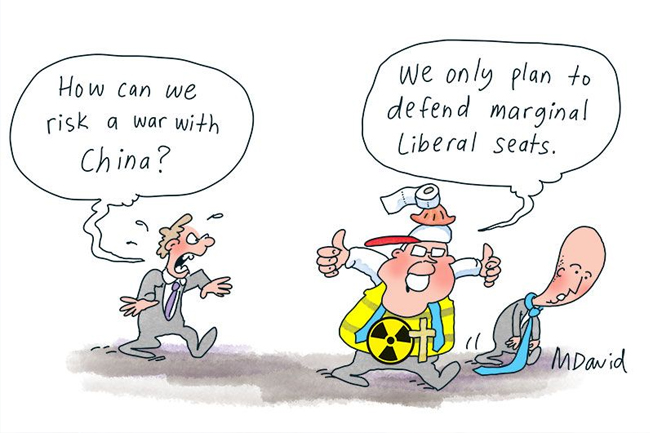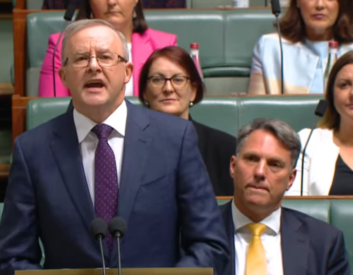Deregulation has given us unstable, anaemic economies with high inequality and the labour parties have demolished their own constituencies, writes Geoff Davies.
ANOTHER ELECTION LOST by Labour, this time in Britain. The Blairites have their long knives out and will no doubt fight to drag the UK Labour Party back to the right. The Australian Labor Party is still gasping like a stunned mullet after its own loss, with no indication it can manage anything beyond continuing to pander to anyone who might still reluctantly give it a preference. With their focus on tactics and personalities, most politicians and commentators miss the big news.
Neoliberalism has failed, comprehensively.
You still hear a dozen times a day about the great economic reforms of the 1980s that set us up for decades of unprecedented prosperity. But repeating the fantasy doesn’t make it true, and the numbers are simple and clear.
The Keynesian social democracy of the postwar decades delivered in Australia GDP growth averaging over 5% with unemployment averaging a minuscule 1.3%. Inflation was a moderate 3.3%. In the neoliberal era, growth has been only 2-4%, unemployment rarely below 5% and there have been several severe financial crashes. The numbers are slightly less dramatic for the whole OECD, but the message is the same.
The English-speaking labour parties tried the free-market path to prosperity, imagining they could tame the beast’s lust for concentrating wealth enough that some would be left over for the average battler. The strategy has doubly failed. Neoliberalism has delivered only feeble prosperity with high inequality and the labour parties have demolished their constituencies.
The alleged superiority of neoliberalism was only ever relative to the 1970s, which were disrupted by a quadrupling of oil prices and the U.S. fudging the costs of its war in Vietnam. In Australia, the neoliberal deregulation of banks gave us a boom in business debt through the 1980s that collapsed in 1990 into the worst recession since the Great Depression, the Keating recession we did not have to have.
We avoided recessions since by running up huge household debts and by Kevin Rudd and Wayne Swan briefly spending directly into the economy, in violation of the neoliberal faith.
Those who still chatter about Australia’s alleged miracle run of nearly 30 years without a recession usually don’t mention the present anaemic state of the economy, growing barely at the rate of the population and therefore stalled or going backwards as far as your average punter is concerned. Young people, especially, can no longer afford a house or a tertiary education.
The neoliberal trickle-down story is a myth. It never shows up. It fails because the wealthy put much of their wealth into unproductive asset speculation and luxuries for themselves, not into productive investment. This keeps the financial markets and housing prices high, but our economy has been hollowed out. We are left with being China’s quarry.
The right-wing neoliberal parties of Margaret Thatcher and John Howard set upon the industrial unions with a vengeance, so it is almost comical now to see the Morrison Government’s continuing obsession with the last feeble vestiges of union power. But Labor and Labour also undermined and defanged the unions, and allowed industries to wither and collapse with little help for displaced workers.
In place of real jobs, people are offered the gig economy, with no security and a likelihood their wages will be stolen as well. Yes, the nature of the economy has changed, but the employed still have a common interest against the owners of capital, as Adam Smith himself well understood in his day.
It is hardly surprising the former workers of the industrial regions are surly and mistrustful. When a strongman comes along and promises to smash the system that has screwed them, they listen. If he also names scapegoats they can hate, they cheer. They may eventually realise their mistake, but by then the strongman may have closed off any escape route.
It is not in the nature of institutions with long histories, such as labour parties, to fundamentally reform themselves. Jeremy Corbyn was unexpectedly thrust into power and he tried to reform, but he could not pull off that huge challenge. Having much of his own party, most of the other parties and most of the media including the BBC ferociously against him certainly did not help.
If the labour parties persist in clinging to the right-wing policies adopted by Keating, Blair and their ilk then their hopes for power will only continue to fade. The unapologetic prophets of greed and bullying will always be better at it.
Worse, unreformed labour parties will further impede the great transition that our societies desperately need, as indeed they have been doing for some time. The alternative, just to be clear, is a police state that will fail to stave off collapse and anarchy.
Awakened people have no option but to go around the old parties, by voting for new and constructive parties or, in the absence of that option, by finding constructive independents willing to actually represent, govern and tackle the great existential challenges now facing our societies. There are some signs of it happening in Australia.
Dr Geoff Davies is a commentator, scientist, and author of Economy, Society, Nature and The Little Green Economics Book. He blogs at BetterNature Books. You can follow Dr Davies on Twitter @BetterNatureOz.
 This work is licensed under a Creative Commons Attribution-NonCommercial-NoDerivs 3.0 Australia License
This work is licensed under a Creative Commons Attribution-NonCommercial-NoDerivs 3.0 Australia License
Support independent journalism Subscribe to IA.












